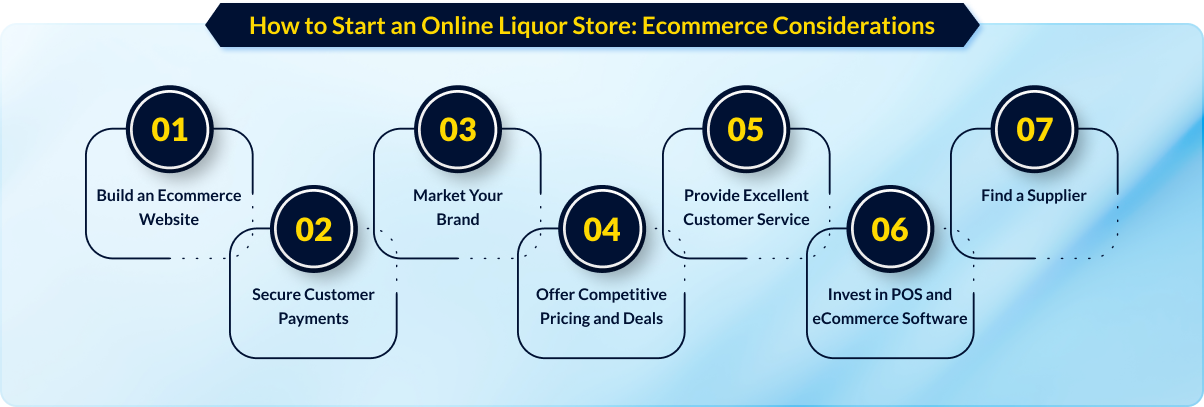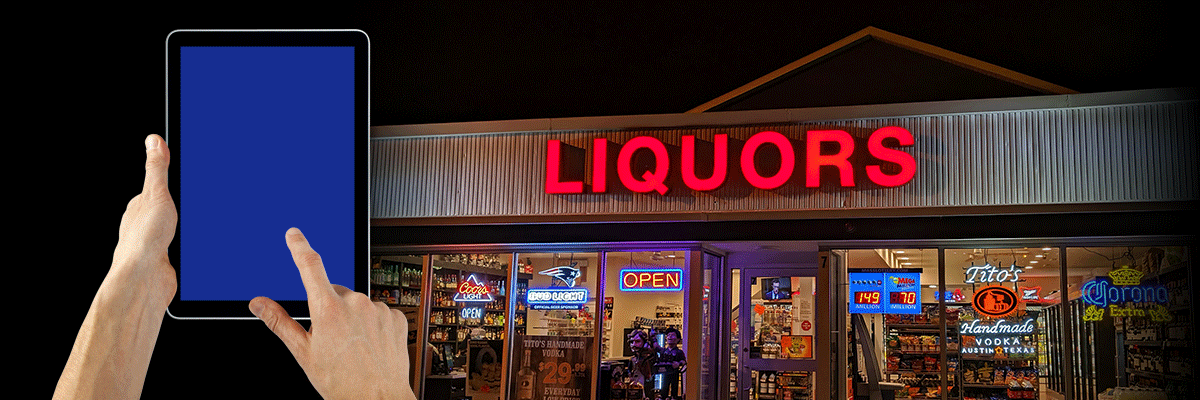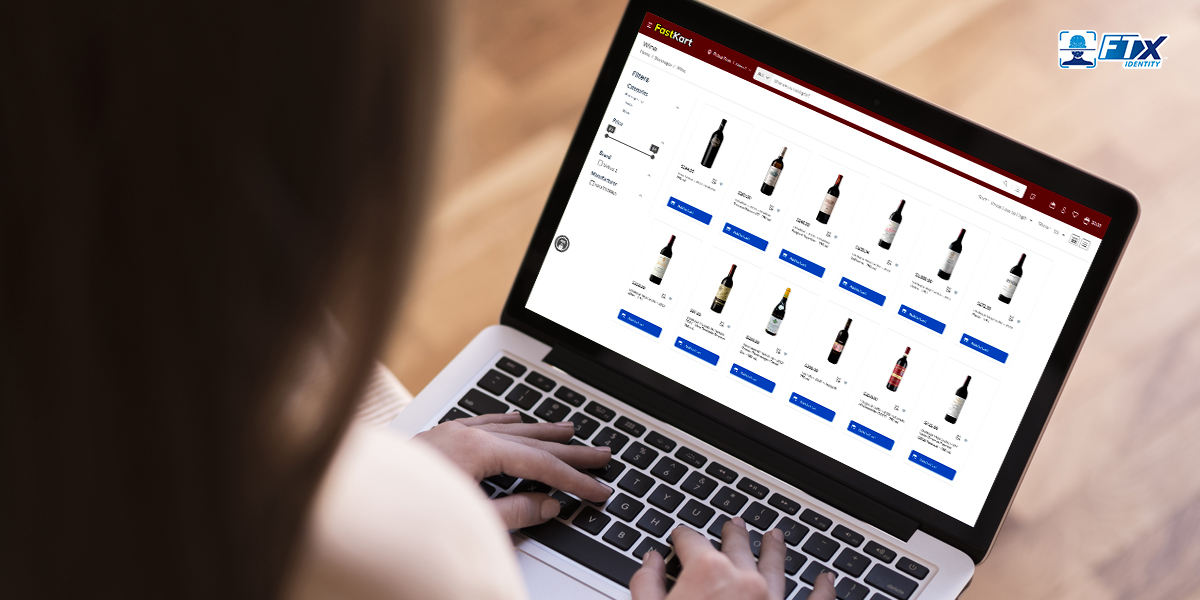Are you a liquor retailer looking to expand your business and reach a broader audience?
With the surging popularity of online shopping, knowing how to sell liquor online and taking your liquor store online could be the ultimate game-changer. However, one of the most critical aspects of selling alcohol online is ensuring strict compliance with age verification rules.
What do

Which States Allow Online Alcohol Sales?
Online alcohol sales require delivery. And unfortunately, alcohol shipping laws are complex and vary by state. Some states allow all types of alcohol to be shipped direct to consumers, while others allow no or only select categories of alcohol (like wine or wine/beer) to be shipped.
Generally, alcohol laws are dependent on a few factors:
- Type of alcohol (liquor, beer, wine, mead, cider, etc.)
- If the alcohol is individually packed (like a growler fill) or manufactured sealed
- Where the order originates (e.g., online vs
in-store )
Similarly, these laws place specific requirements on delivery. For example, some states have rules on the types of businesses that can deliver, if third-party delivery is OK (e.g., DoorDash), or if a special permit is required by the company.
Alcohol Delivery Laws by State
Here’s a look at how different states regulate alcohol delivery:
- All Spirits – Several states allow all spirits (liquor, wine, beer) to be shipped directly to consumers. These states include: Washington, D.C., Florida, Hawaii, Kentucky, Nebraska, New Hampshire, Rhode Island, and West Virginia.
- Beer and Wine – Other states allow beer and wine (but not spirits) to be shipped to consumers. These states include: Delaware, Massachusetts, Montana, North Dakota, Ohio, Oregon, Vermont, and Virginia.
- Wine and Fermented Spirits – Several states allow wine, mead and cider to be shipped, but not beer or spirits. These states include: New Jersey, Connecticut, New Mexico, and Arkansas. However, laws vary by state. Some states allow cider, but not mead.
- Wine Only – All other U.S. states allow wine to be shipped to consumers. However, these laws vary by state.
Read More:ID Scanning Laws by State: Legal Requirements for Businesses
Exceptions
Some states do not allow orders to originate online. For example, if you buy a case of wine at a winery, the case can be shipped to your home, but you can’t order directly online. Arkansas, for example, doesn’t allow online orders.
In some cases, the buyer must be a resident of the state the order was placed in. Finally, Utah is the only state that doesn’t allow alcohol delivery of any kind.

How to Start an Online Liquor Store: Ecommerce Considerations
There are a few key steps that businesses need to follow to start selling alcohol online. Ultimately, many of these requirements are similar for selling CBD online. They include:
1. Build an Ecommerce Website
To succeed in the competitive world of online liquor sales, you must create a visually appealing and user-friendly website. Showcase your liquor selection with high-quality images and detailed descriptions to entice potential customers. An easy-to-navigate interface and clear product categorization will enhance the shopping experience and encourage repeat visits.
Related Read: 6 Fraud Risks in Ecommerce: How to Respond and What to Do
2. Secure Customer Payments
Security is paramount when handling online transactions for alcoholic beverages. Partner with trusted and reputable payment gateways to ensure that customers’ personal and financial information remains safe and protected. Display security badges and SSL certificates prominently on your website to instill confidence in potential buyers.
3. Market Your Brand
Social media is a powerful tool for promoting your online liquor store and engaging with your target audience. Establish a strong presence on platforms like Facebook, Instagram, and Twitter, where you can share enticing visuals, offer exclusive deals, and respond to customer inquiries promptly. Social media interactions can foster a sense of community and loyalty around your brand.
4. Offer Competitive Pricing and Deals
Offering attractive pricing and special deals will help you attract and retain customers. Conduct market research to set competitive prices and periodically offer discounts, promotions, or loyalty programs to incentivize repeat purchases. Free shipping is often a strong sales driver in ecommerce.
5. Provide Excellent Customer Service
Outstanding customer service is the cornerstone of any successful online business. Be responsive to customer inquiries and feedback, whether through email, live chat, or phone. Address any concerns promptly and professionally to ensure a positive shopping experience that encourages word-of-mouth referrals.

6. Invest in POS and eCommerce Software
Ensure that the liquor POS is a comprehensive, all-in-one system. It must be compatible to integrate with your eCommerce platform. Selling liquor online comes with complexities and unique challenges like age verification for online alcohol sales, inventory management, etc.
We recommend selecting the best POS system and eCommerce platform tailored for the liquor industry that helps businesses remain in compliance and saves time on daily operations. A set of features to look for may include:
- Real-time inventory tracking ensures your online and physical stores are always stocked with popular and fast-moving spirits, keeping your customers happy.
- A built-in loyalty program such as ‘Loyal-n-Save’ from FTx allows retailers to quickly onboard customers and rewards them every time they purchase liquor online or in-store
- A reporting and analytics feature that shows not only your store’s performance, but also helps you with insights like customers’ preferences and buying patterns
- Age verification for online alcohol sales is mandatory to keep your liquor license in check and avoid any fines and penalties.
See How Easy It Is To Launch A Successful Liquor Rewards Program >
The ideal liquor POS solution seamlessly integrates with an eCommerce platform, making online liquor sales effortless.
7. Find a Supplier
Building a successful online liquor business means managing several key elements, one of which is establishing a strong relationship with a reliable alcohol wholesale supplier. This ensures your inventory remains well-stocked at all times, leaving you ample time to focus on sales, marketing, and operations.
Selling Liquor Online: ID Laws, Local Laws and Licensing
There are many laws and regulations you must adhere to before you open a liquor store online. Focus on these laws:
1. Check Local Laws and Regulations
Liquor laws vary widely by county or even local jurisdiction. Although home alcohol delivery may be OK in your state, check with local regulations.
2. Prioritize Age Verification
Age verification is non-negotiable when selling alcohol online. Implement robust age verification systems that require customers to provide valid identification to prove they are of legal drinking age.
You can build this directly into your online store, using selfie verification and ID scanning to cross-reference documents. Be sure you also use a system that blocks common reasons minors get around age verification online.
Additionally, make sure the delivery company you work with understands ID checking requirements. Many states require IDs to be checked whenever alcohol is delivered.
3. Obtain Licenses and Permits
Selling alcohol online typically requires specific licenses and permits from relevant authorities. Contact your local liquor control board or licensing agency to obtain the necessary documentation for your online liquor business. Failure to obtain the required permits can lead to legal consequences and the suspension of your operations.
4. Partner with Reliable Delivery Services
Shipping alcoholic beverages requires special care and adherence to strict regulations. Partner with reliable and experienced delivery services that have a proven track record of handling alcoholic beverages responsibly and in compliance with legal requirements. For local deliveries, a third-party delivery company like Uber Eats may suffice (however, check your local regulations to learn more).
Final Thoughts
Taking your liquor store online opens new growth avenues. However, it’s often a difficult process with added legal requirements. However, if you build a beautiful website, prioritize age verification, and build an effective (and legal) fulfillment process, your shop will thrive.
Need some help with age verification? FTx Identity offers an age verification suite that’s perfect for online sellers of age-restricted products. Our tools help websites verify age, for a robust, compliant online shopping experience. Learn more today!
Staying compliant has never been easier!
Protect your business with our user-friendly identity verification solutions in-store and online.
